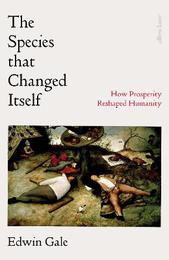
|
The Species that Changed Itself: How Prosperity Reshaped Humanity
Hardback
Main Details
| Title |
The Species that Changed Itself: How Prosperity Reshaped Humanity
|
| Authors and Contributors |
By (author) Edwin Gale
|
| Physical Properties |
| Format:Hardback | | Pages:384 | | Dimensions(mm): Height 240,Width 162 |
|
| Category/Genre | Genetics (non-medical)
Human biology |
|---|
| ISBN/Barcode |
9780241292693
|
| Classifications | Dewey:304.2 |
|---|
| Audience | | Tertiary Education (US: College) | | Professional & Vocational | | General | |
|---|
|
Publishing Details |
| Publisher |
Penguin Books Ltd
|
| Imprint |
Allen Lane
|
| Publication Date |
26 November 2020 |
| Publication Country |
United Kingdom
|
Description
An inquisitive, expansive and fascinating exploration of how humans have, in changing the world, changed ourselves Other species adapt to their environments; we alone create ours. Over generations, we have remade the world to suit ourselves - using improved knowledge and technology to confront the traditional scourges - and for the most part we enjoy prosperity beyond the dreams of our ancestors. What's more, in changing our world, we have also reshaped the human phenotype - the interaction between genes and environment that moulds our bodies and minds. The results can be seen in the streets of our post-industrial cities. We are taller and heavier, and live longer. We think and behave differently, and die from once-rare diseases. Our experiences of life have been transformed, and in turn so have our societies. Weaving together biology, social anthropology, epidemiology and history, Edwin Gale examines the shifting physical and mental dimensions of our lives, from ageing to illness, food production to reproduction, designer bodies to IQ tests, and asks- are we a self-domesticated species?
Author Biography
Edwin Gale studied English Literature at Cambridge before switching to a career in medicine. He worked in Cambridge, Nottingham, Copenhagen, and as a professor at St Bartholomew's Hospital, London. Research into the rise of diabetes stimulated his interest in our changing phenotype. He moved with his team to the University of Bristol in 1997, and retired in 2011.
ReviewsA fascinating thesis argues that biologically we are unlike any generation that has gone before... [Gale's] book is humane and fascinating and it boasts a compelling argument. You will not be bored reading it and if you can't be bothered to read it cover to cover you can simply open it at random to find a good story for your next dinner party. -- James Marriot * Times *
|